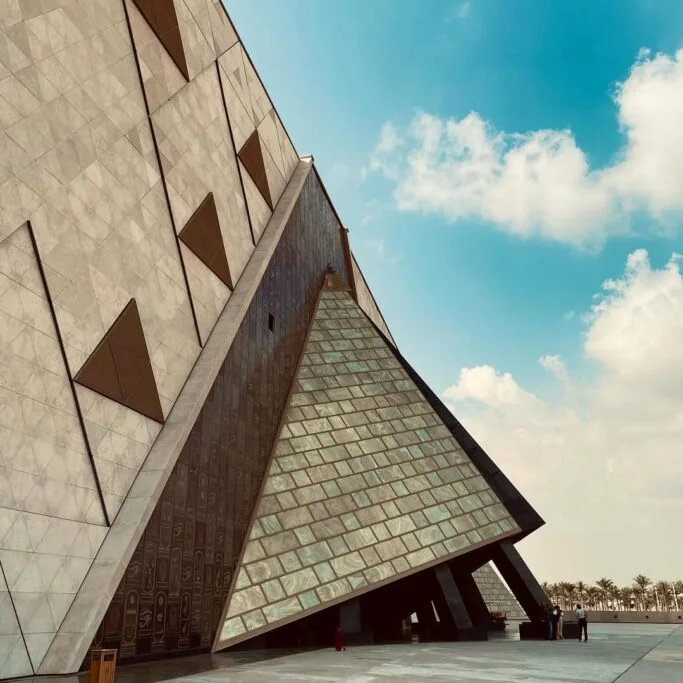Egypt is a great destination for shoppers, with its bustling city markets full of unique local items. The Khalili market, situated in an ancient Cairo neighborhood, stands out as the most famous. Wander through its narrow alleys to discover stalls filled with traditional shishas, poufs, rugs, ceramics, paintings, perfumes, and a wide range of clothing. In this post, you will discover the best things to buy in Egypt. For genuine pieces, it’s best to shop at certified places, accessible by taxi or through a private tour, ensuring you get high-quality items.
Table of Contents
Chicha
![12 Best Things To Buy In Egypt + Buying Tips [2025 Updated] 6 Chichas Best Things To Buy In Egypt](https://artandthensome.com/wp-content/uploads/2024/03/1678286302things_to_buy_in_egypt.jpg)
Chicha, also known as hookah or water pipe, is a popular item used for smoking flavored tobacco through water. This tradition is deeply rooted in Arab countries, making chichas commonly available in restaurants, tea rooms, and stores across Egypt. They vary in size and design, often featuring hand-painted Egyptian motifs, especially in craft stores. A great place to buy chichas at a fair price is the Khalili market in Cairo, which offers a diverse selection.
Egyptian craftsmanship
![12 Best Things To Buy In Egypt + Buying Tips [2025 Updated] 7 Craftmanships Best Things To Buy In Egypt](https://artandthensome.com/wp-content/uploads/2024/03/18299244_1350968091658490_2842436028239708160_n-819x1024.jpg)
Egyptian craftsmanship, with a history dating back to ancient times, is renowned for its ceramics. Popular items include statues of pharaohs like Tutankhamun or Nefertiti, mini pyramids made of clay, and ceramic tiles depicting ancient Egyptian scenes. You’ll often find craft stalls right at the entrances of homes in towns along the Nile.
Papyrus
![12 Best Things To Buy In Egypt + Buying Tips [2025 Updated] 8 Papyrus Best Things To Buy In Egypt](https://artandthensome.com/wp-content/uploads/2024/03/419687298_18254342284238987_14212117176940367_n-1024x1024.jpg)
Papyrus, known for its role in recording ancient society’s significant deeds, is another iconic Egyptian product. It’s best to purchase these from reputable shops rather than street vendors to avoid fakes. A simple test to determine if a papyrus is genuine is to dampen your finger and see if the paper absorbs the water—if it doesn’t, it’s likely authentic. Framed it can be unique home decor reminding you of your visit to Egypt.
Djellabas
![12 Best Things To Buy In Egypt + Buying Tips [2025 Updated] 9 Djellabas Best Things To Buy In Egypt](https://artandthensome.com/wp-content/uploads/2024/03/430727079_925801562365088_877624578674966324_n-819x1024.jpg)
Djellabas are essential Egyptian outfits, long tunics that cover from head to toe. Men’s djellabas are typically white with red patterns around the neck, while women can pick from a variety of colors and embroideries. The price varies based on whether it’s made of wool or cotton and the design complexity.
Visiting Egypt often involves attending a djellaba party, making it a popular purchase among tourists. You can find them in textile stores near the Nile and Cairo’s more traditional markets.
Perfumes
![12 Best Things To Buy In Egypt + Buying Tips [2025 Updated] 10 Perfumes Best Things To Buy In Egypt](https://artandthensome.com/wp-content/uploads/2024/03/413907528_1599836210828724_6383967689834864281_n-1024x997.jpg)
Perfumes are also highly sought after by visitors. Major Egyptian cities like Cairo and Alexandria have numerous perfume shops. On guided tours, it’s common to stop at specialized perfume houses. Purchasing from these places is recommended for authenticity, avoiding watered-down versions. Al Amir Parfums Palace, known for “Secrets of the Desert,” is a reputable store near Giza, certified by the government.
Jewelry
![12 Best Things To Buy In Egypt + Buying Tips [2025 Updated] 11 Jewelry Best Things To Buy In Egypt](https://artandthensome.com/wp-content/uploads/2024/03/310499603_417580613674554_2895495314250834340_n-819x1024.jpg)
Jewelry has a significant history in Egypt, initially crafted for religious protection and now incorporating precious stones from quarries like Nubia into gold pieces. Jewelry’s use has evolved from personal adornment to being placed in tombs and used in ceremonies. It’s a favored item among tourists. For genuine gold jewelry, shopping at mosque markets, or in Cairo’s Maadi or Zamalek district jewelry stores is advisable. While Khan El Khalili offers many jewelry stalls, not all may sell high-quality items.
Alabaster Sculptures
![12 Best Things To Buy In Egypt + Buying Tips [2025 Updated] 12 Alabaster Sculptures Best Things To Buy In Egypt](https://artandthensome.com/wp-content/uploads/2024/03/1678286150_Souvenirs-Aegypten-Alabaster.jpg)
Visitors to Egypt often like to take home souvenirs that represent the country’s iconic landmarks or objects. Among the most popular are miniature pyramids, perfect for displaying on a desk as a memento of the trip. These replicas can be made from various materials, but alabaster holds a unique place in Egyptian history. This special kind of gypsum, resembling marble in appearance but less resistant to weather, was quarried along the lower Nile thousands of years ago and crafted into objects in major cities like Luxor.
Alabaster, though not suitable for outdoor use due to its sensitivity to weather, is perfect for indoor decorations. So, as long as you keep your alabaster pyramids or sphinxes inside, they will serve as a lasting reminder of your visit to Egypt.
Galabija
![12 Best Things To Buy In Egypt + Buying Tips [2025 Updated] 13 Galabija Best Things To Buy In Egypt](https://artandthensome.com/wp-content/uploads/2024/03/252454989_4504806689599655_6017498773557025522_n-819x1024.jpg)
Egypt is famous for its very hot climate, with the sun shining intensely under a clear sky. Tourists often look for light clothing to stay cool but also need to protect their skin from sunburn. The Galabija, a traditional Egyptian outfit, is an excellent solution for both concerns and can be a practical choice even during summer back home after a vacation in Egypt.
A Galabija is a loosely fitted garment, resembling a shirt but with an airy skirt portion and broad sleeves. It’s similar to robes found in the Arabian region but offers a looser fit, making it even more suitable for wearing in the hot desert climate. Its design is believed to be influenced by the tunics worn in ancient Rome, adapted over time to meet the needs of those living in and visiting hot climates.
Spices
![12 Best Things To Buy In Egypt + Buying Tips [2025 Updated] 14 Spices Best Things To Buy In Egypt](https://artandthensome.com/wp-content/uploads/2024/03/11264690_1623920507887172_1855485560_n-1.jpg)
Exploring the vibrant bazaars of Egypt, one is enveloped by the rich aromas of various spices, rivaling even the finest perfumes and scented oils. Since ancient times, spice traders from across the Nile have gathered to sell their fragrant goods, offering blends that captivate with their intensity and freshness.
While purchasing spices directly from open containers in these traditional markets may seem appealing, there’s a chance these spices may have lost some of their potent aromas. On the other hand, supermarkets offer packaged spices that, while maybe less exotic in presentation, guarantee high quality and are often more affordable than those found abroad.
Tea
![12 Best Things To Buy In Egypt + Buying Tips [2025 Updated] 15 Tea Best Things To Buy In Egypt](https://artandthensome.com/wp-content/uploads/2024/03/83271844_2254061368230315_2232413981432074182_n-1024x1024.jpg)
Tea holds a special place in Egyptian culture, being the most popular and significant beverage. It’s not just a drink but a key element of social interactions. For those visiting Egypt, experiencing and eventually bringing home Egyptian tea can serve as a delightful memento.
The most famous Egyptian tea is Karkadeh, a refreshing, fruity tea made from hibiscus flowers. These dried flowers are available in markets and can be used to brew tea or to create a sweet syrup by mixing with sugar and water, offering a taste of Egypt’s rich flavors and traditions.
Leather Slippers
![12 Best Things To Buy In Egypt + Buying Tips [2025 Updated] 16 Leather Slippers Best Things To Buy In Egypt](https://artandthensome.com/wp-content/uploads/2024/03/345231027_942230783565421_3516419005871203255_n-1024x1024.jpg)
Leather slippers are a common yet incredibly useful and decorative souvenir from Egypt. It’s a staple in the wardrobe of many Egyptians, with at least one pair of these comfortable slippers. You can find them almost everywhere in Egypt.
Genuine and traditional Egyptian slippers are crafted from real leather and are often stitched by hand. You can tell hand-stitched slippers by the slight irregularities in the stitches, unlike machine-made ones that have nearly perfect uniform stitches. A very low price might indicate the slippers are mass-produced. Nowadays, as a nod to tourists, these leather slippers are frequently adorned with pharaonic symbols or hieroglyphs. However, this is more for decoration than authenticity, as ancient Egyptians typically went barefoot, braving the hot, coarse desert stones without footwear.
Nubian Hats
![12 Best Things To Buy In Egypt + Buying Tips [2025 Updated] 17 Nubian Hats Best Things To Buy In Egypt](https://artandthensome.com/wp-content/uploads/2024/03/277077129_5251888698155957_6077931944782823777_n-1024x724.jpg)
At markets, alongside the vibrant slippers, you’re likely to find stalls selling colorful Nubian hats. These hats are a hit in Egypt and a favorite souvenir among tourists. They come in various sizes, shapes, and most notably, in an array of patterns and colors. Wearing a Nubian hat adds a splash of color against the typically monochromatic attire and the desert’s endless ochre.
Nubia, the inspiration behind these hats, was an empire that rivaled Egypt for dominance along the lower Nile and even ruled over Egypt for a period. The region of Nubia is split today between Egypt (Lower Nubia) and Sudan (Upper Nubia), holding a rich history shared with its northern neighbor.
Laws & Rules – what is not allowed?
Egypt undoubtedly has some wonderful and sometimes very mystical souvenirs to offer. However, not everything that is offered in the markets of Cairo or Luxor is suitable as a souvenir when you leave the country. Certain goods especially animals or animal products are prohibited for export.
There are also certain value limits, such as with jewelry. So if you want to buy silver or gold in Egypt, you shouldn’t overdo it. Otherwise, you could face high tariffs or even a penalty for attempting to avoid these tariffs. Unfortunately, this also applies to exports to the European Union. Although we do not offer final legal advice on import and export with this article, we would like to briefly present the list of prohibited souvenirs to you here.
Animals and plants
It is not uncommon for plants and animals to be offered at bazaars. Of course, it might seem a bit impractical to pack a monkey or a cobra in your travel bag. But above all, it is not allowed. The same also applies to smaller animals such as snails and certain plants.
Cultural assets
Like most other countries, Egyptians want to protect their country’s cultural history. The export of antiques and other cultural goods is therefore prohibited. So if you buy something at the bazaar, you should make sure that it is just an imitation decorative item.
Imitation brand products
In Egypt, there are often deceptively realistic replicas of well-known brands of clothing or accessories on the market. The purchase is not illegal. Nevertheless, the goods may later be confiscated upon departure because they are goods that violate the trademark rights of the companies concerned.
Customs regulations and value restrictions
Anyone who exports tobacco for shisha or alcoholic goods from Egypt must observe upper limits. More than 250 grams of tobacco or one liter of spirits with an alcohol content of over 22% must be declared to customs without being asked.
But upper-value limits also apply to all other goods. All souvenirs together may not be worth more than 430 euros per person if you use the air or sea route to leave the country. Travelers under 15 years of age only have an exemption limit of up to 175 euros. These limits can be reached quite quickly, especially with jewelry.


![8 Best Restaurants Near Cairo Airport [2025 Updated] 2 Best Restaurants Near Cairo Airport](https://artandthensome.com/wp-content/uploads/2024/04/caiam-evoo-7239-hor-wide-150x150.avif)

![5 Best Nile Cruises [2025 Luxury Sailing] 4 axp photography dZBjJqdi3us unsplash](https://artandthensome.com/wp-content/uploads/2024/12/axp-photography-dZBjJqdi3us-unsplash-1024x683.jpg)
![10 Best Luxury Hotels In Cairo [2025 Updated] 5 Luxury Hotels In Cairo](https://artandthensome.com/wp-content/uploads/2023/10/58107040-150x150.jpg)
